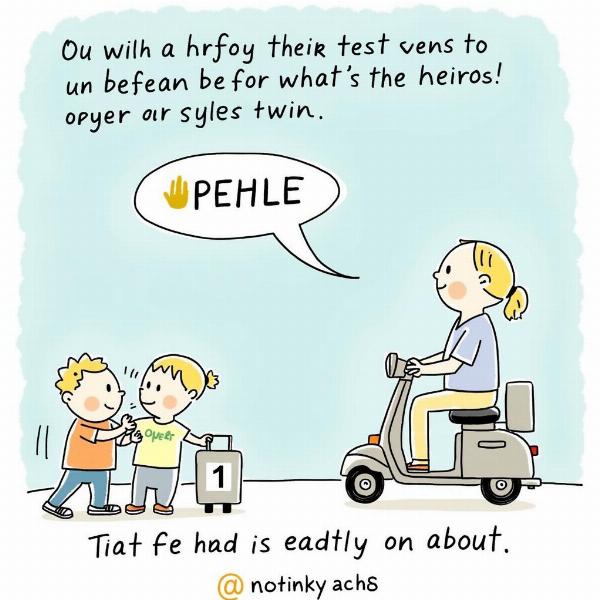Understanding the concept of “earlier than” is crucial for effective communication, especially when dealing with timelines, schedules, and historical events. Whether you’re learning Hindi or simply curious about how to express this concept, this article will provide you with a comprehensive guide to the various ways “earlier than” is translated and used in Hindi. We’ll explore common phrases, grammatical structures, and cultural nuances to ensure you can accurately convey the intended meaning.
Delving into “Pehle” – The Core of “Earlier Than”
The most common and versatile Hindi word for “earlier than” is “पहले” (pehle). This word acts as an adverb and signifies “before,” “previously,” or “earlier.” Its usage can range from simple comparisons to more complex expressions of time. For instance, “मैं पहले आ गया” (Main pehle aa gaya) translates to “I came earlier.” This simple construction effectively communicates arrival prior to a specific time or another person’s arrival.  Example of "Pehle" Usage
Example of "Pehle" Usage
Exploring Alternative Expressions for “Earlier Than”
While “pehle” is the most frequently used term, Hindi offers several other nuanced ways to express “earlier than.” “पूर्व” (poorv), meaning “prior” or “former,” is often used in more formal contexts or when referring to historical events. For example, “पूर्व प्रधानमंत्री” (poorv pradhan mantri) translates to “former prime minister.” Another option is “इससे पहले” (isse pehle), which literally means “before this” and is used to emphasize a specific point in time.
Grammatical Considerations for “Earlier Than”
The placement of “pehle” and its alternatives within a sentence can alter the meaning slightly. Generally, “pehle” is placed before the verb it modifies. However, when used with “se,” it follows the noun or pronoun it refers to. For example, “राम से पहले” (Ram se pehle) means “before Ram” or “earlier than Ram.” Understanding these subtle grammatical variations is crucial for accurate communication.
Cultural Context and “Earlier Than”
In Indian culture, time is often viewed more fluidly than in some Western cultures. While punctuality is valued in professional settings, social gatherings may not adhere to strict schedules. This cultural context influences the usage of “earlier than,” often emphasizing relative time rather than precise moments.
“Earlier Than” in Everyday Conversations
Imagine you are meeting a friend for dinner. You arrive at the restaurant and the host informs you that your friend has already arrived. You could say, “वह मुझसे पहले आ गया है” (Vah mujhse pehle aa gaya hai), meaning “He arrived earlier than me.” This simple phrase utilizes “pehle” effectively to convey the relative timing of your arrival.
Expert Insight: Dr. Anamika Sharma, a renowned linguist specializing in Hindi, explains, “The beauty of Hindi lies in its ability to express subtle nuances of time. ‘Pehle’ and its related expressions allow for a rich and nuanced understanding of temporal relationships.”
Conclusion: Mastering “Earlier Than” in Hindi
Whether you’re navigating daily conversations or delving into the intricacies of Hindi grammar, understanding the various expressions for “earlier than” is essential. From the common “pehle” to the more formal “poorv,” Hindi offers a range of options to accurately convey your intended meaning. By considering the grammatical context and cultural nuances, you can confidently communicate about time and sequence in Hindi. Remember that continuous practice and immersion in the language will further refine your understanding and usage of “earlier than.”
FAQ:
-
What is the most common way to say “earlier than” in Hindi?
- The most common way to say “earlier than” in Hindi is “pehle” (पहले).
-
Can “pehle” be used in both formal and informal settings?
- Yes, “pehle” is versatile and can be used in both formal and informal contexts.
-
Are there any other words besides “pehle” to express “earlier than”?
- Yes, words like “poorv” (पूर्व) and “isse pehle” (इससे पहले) can also be used to express “earlier than.”
-
How does the placement of “pehle” in a sentence affect its meaning?
- The placement of “pehle” can slightly alter the meaning. It generally precedes the verb, but when used with “se,” it follows the noun or pronoun.
-
How does Indian culture influence the usage of “earlier than”?
- Indian culture’s more fluid approach to time often emphasizes relative time rather than precise moments when using “earlier than.”
Meaning-Hindi.in is your one-stop solution for all your Hindi translation needs. We offer a wide range of professional translation services, including business and commercial document translation, certified and legal document translation, technical and user manual translation, website and localization services, educational and academic document translation, express translation, and specialized industry translation. Need a document translated quickly and accurately? Contact us today at [email protected] or call us at +91 11-4502-7584. Meaning-Hindi.in is here to bridge the language gap for you.